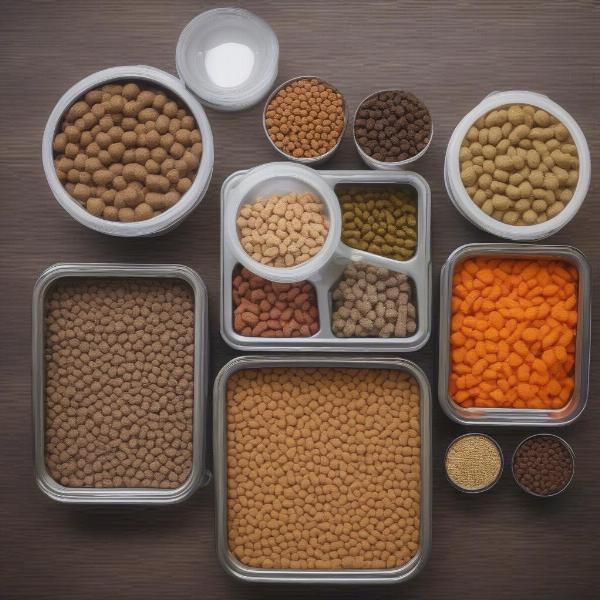Pancreatitis in dogs can be a serious and painful condition. A critical aspect of managing pancreatitis, both acute and chronic, revolves around dietary management. Choosing the right dogs with pancreatitis diet is essential for supporting your furry friend’s recovery and long-term health. This article will provide a comprehensive guide to understanding pancreatitis in dogs and navigating the complexities of a pancreatitis-friendly diet.
Understanding Pancreatitis in Dogs
Pancreatitis is the inflammation of the pancreas, an organ crucial for digestion and regulating blood sugar. When inflamed, the pancreas releases digestive enzymes within the organ itself, leading to pain and potential damage. Symptoms can range from mild discomfort to severe illness, including vomiting, diarrhea, loss of appetite, lethargy, and abdominal pain.
Several factors can contribute to pancreatitis, including a high-fat diet, obesity, certain medications, trauma, and underlying health conditions. Early diagnosis and appropriate management are vital for a positive outcome.
Key Dietary Principles for Dogs with Pancreatitis
A low-fat diet is the cornerstone of managing pancreatitis in dogs. This helps reduce the workload on the pancreas and allows it to heal. Here are the key dietary principles:
- Low Fat: Fat restriction is crucial. Aim for a diet containing less than 10% fat on a dry matter basis.
- Highly Digestible: Choose foods that are easy for your dog to break down and absorb. This minimizes stress on the digestive system.
- Moderate Carbohydrates: Carbohydrates provide energy without overstimulating the pancreas.
- High-Quality Protein: Protein is essential for tissue repair and overall health. Opt for lean protein sources.
- Small, Frequent Meals: Feeding smaller meals more frequently can help regulate digestion and prevent overloading the pancreas.
 Low-Fat Dog Food Options for Pancreatitis
Low-Fat Dog Food Options for Pancreatitis
Choosing the Right Food
Selecting the appropriate dog food can feel overwhelming. Consult your veterinarian for personalized recommendations based on your dog’s specific needs. They might suggest:
- Prescription Diets: These diets are specifically formulated for dogs with pancreatitis and offer precise nutrient control.
- Commercial Low-Fat Diets: Several commercial dog food brands offer low-fat options suitable for dogs with pancreatitis. Carefully check the fat content on the label.
- Homemade Diets: Under the guidance of a veterinary nutritionist, homemade diets can be tailored to your dog’s individual requirements. It’s crucial to ensure nutritional balance to avoid deficiencies.
Foods to Avoid
Certain foods can exacerbate pancreatitis and should be strictly avoided:
- High-Fat Foods: This includes fatty meats, table scraps, and treats rich in fat.
- Dairy Products: Many dogs are lactose intolerant, and dairy can worsen pancreatitis symptoms.
- Processed Foods: These often contain high levels of fat, salt, and artificial ingredients that can irritate the pancreas.
Managing Flare-Ups
Even with a strict diet, occasional flare-ups can occur. During a flare-up, your veterinarian might recommend temporarily withholding food to allow the pancreas to rest. When reintroducing food, start with small, bland, and easily digestible meals.
Conclusion
A carefully managed dogs with pancreatitis diet plays a vital role in supporting your dog’s recovery and preventing future episodes. By adhering to the principles outlined above and working closely with your veterinarian, you can provide your furry friend with the best possible care and improve their quality of life.
FAQ
- What are the first signs of pancreatitis in dogs? Vomiting, diarrhea, loss of appetite, lethargy, and abdominal pain.
- Can dogs with pancreatitis eat treats? Treats should be limited and low in fat. Consult your veterinarian for recommendations.
- Is pancreatitis in dogs curable? Acute pancreatitis can often be resolved with treatment. Chronic pancreatitis requires ongoing management.
- What is the best food for dogs with pancreatitis? A low-fat, highly digestible diet prescribed or recommended by your veterinarian.
- How long does a dog need to be on a pancreatitis diet? This varies depending on the severity and type of pancreatitis. Your veterinarian will advise.
- Can pancreatitis in dogs be fatal? Yes, severe cases of pancreatitis can be life-threatening.
- Are certain dog breeds more prone to pancreatitis? Yes, some breeds, such as Miniature Schnauzers, are predisposed.
Related Articles
ILM Dog is your trusted global resource for expert dog care advice. We provide comprehensive information on dog breeds, health, training, nutrition, grooming, and much more. Whether you’re a seasoned dog owner or just starting your journey, ILM Dog is here to help you navigate every aspect of dog ownership. For personalized advice and support, connect with our team of experts. Email us at [email protected] or call us at +44 20-3965-8624. Visit ILM Dog today!